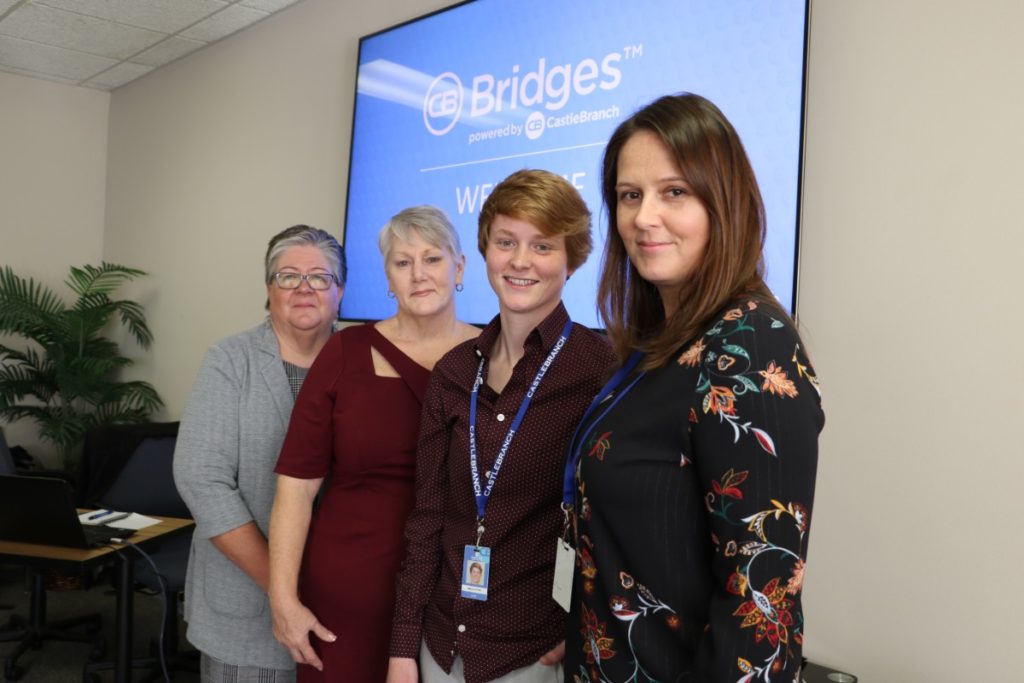
Written by: Stacey Kellogg
February 18, 2019
Northwest Indiana is rich with healthcare jobs ripe for the picking. Thanks to the Northwest Indiana Workforce Board Healthcare Consortium, key players are busting barriers that have historically been keeping students from efficiently landing careers at hospitals and clinics throughout the Region.
The Consortium comprises local hospitals and health systems, universities and vocational training centers, and K-12 educators.
“The Northwest Indiana Workforce Board (NWIWB) felt the consortium would help to identify pressing issues and challenges facing the workforce in healthcare,” said Barb Grimsgard, Communications Manager at the Center of Workforce Innovations (CWI) and staff to the NWIWB. “The collaborative approach allows our regional healthcare executives to address challenges in common, as opposed to individually.”
The February 8 meeting at CWI was for training on a new software platform, CB Bridges™ by CastleBranch. CB Bridges™ will ultimately help students get matched, scheduled, and actively working in the clinical rotations of their choice.
Clinical rotations are required of nursing and other healthcare students, whereby they’re immersed in the hospital or clinic unit of their choice to gain in-field experience.
“When we brought everyone together, what we found is that schools and healthcare organizations were all having the same struggles,” said Sandra Alvarez, Senior Associate of Employer Engagement for Center of Workforce Innovations.
In particular, they’re all battling the same national shortage of nurses, medical assistants, and other critical healthcare occupations.
“It became evident that there were some root causes for some of those shortages,” Alvarez said.
The most prominent one they’ve identified so far: administrative red tape and tedious tracking systems that are slowing down or even preventing students from successfully completing clinical rotations at hospitals and clinics.
“We’ve seen students coming to our clinics with a lot of interest in doing a rotation, but regionally there isn’t a lot of consistency for things like documentation and training,” said Chris Beebe, Chief Human Resources Officer for HealthLinc.
Alvarez concurred, sharing anecdotes of healthcare professionals spending hours tracking down documentation of a student’s competencies – such as CPR training – and students showing up for clinicals only to be turned away because paperwork was missing.
And in the middle of all of it, there’s a student, eager to enter healthcare and ready to work.
“The more we can do to provide a positive student experience as they enter their clinicals, the better chance we have at keeping them in the industry and guiding them toward a fulfilling career,” Bebee said.
In facilitating these conversations, Alvarez along with her colleagues at CWI and consortium members researched organizations who have studied the issue. They believe they’ve found a solution in CB Bridges™. The sophisticated software solutions provides a repository of student data to track their preferred clinical placement at facilities, their orientation and onboarding documentation (such as required training mentioned above), and a scheduling module to facilitate their clinical rotation scheduling at hospitals and clinics.
“This is a solid, regional approach to providing a better student experience, and to eliminating the waste and duplication that burdens clinical educators and healthcare providers when they are trying to connect students to careers,” said Tony Ferracane, Vice President of Human Resources with Community Healthcare System. The system – one of the largest in the Region – comprises Community Hospital in Munster, St. Catherine Hospital in East Chicago, St. Mary Medical Center in Hobart, and dozens of physician clinics.
At Friday’s training and onboarding meeting, consortium members were actively engaged in lively conversation.
“We believe our local healthcare professionals appreciate the peer-to-peer approach and the consortium platform, where they can lay things out on the table and work as one to take the issues and challenges related to ensuring their current and future workforce is as skilled and productive as needed,” Grimsgard said.
Christina Ashley, Associate Director of Customer Success with CastleBranch, said the CB Bridges™ platform provides an innovative solution, based on research about what works.
“It’s a compliance platform that makes it easier for students to do their clinicals by streamlining the process for everyone involved – the school, the student, and the healthcare provider,” Ashley said.
The entire student’s clinical rotation experience – from placement at a facility, to orientation and onboarding, to scheduling – is housed in a central place and updates are accessible in real time. “It provides students peace of mind,” Ashley said.
“When you think about it, this is huge,” Alvarez said. “You might have one hospital or school tracking a student’s competencies in Excel or on paper. Another one is tracking it in a system that nobody else can see. We are now bringing it all together, in one place, and it is being built from the ground up with input from our healthcare consortium partners,” Alvarez said.
Besides the CB Bridges™ platform, the Northwest Indiana Healthcare Consortium is sharing information about other innovative pilots that are helping connect high school students with meaningful career paths early.
“We’re talking about what is working, and how we can replicate programs that will place students on a graduation pathway as early as their freshman year,” Alvarez said. The group continues to explore programs that help high school students easily transition into post-secondary education.
“The work of the NWIWB and CWI is entirely focused on facilitating and finding those workforce solutions to ensure that employers in our high demand sectors, whether healthcare, manufacturing, logistics, professional services or IT, find those students or adults who have the skill sets and work ethics to perfectly match their needs,” said Linda Woloshansky, President & CEO of CWI. “The progress being made in the healthcare consortium certainly gives promise to achieving that goal,” she added.
View full article with photos on NWILife.com.
Copyright © 2019 Ideas in Motion Media